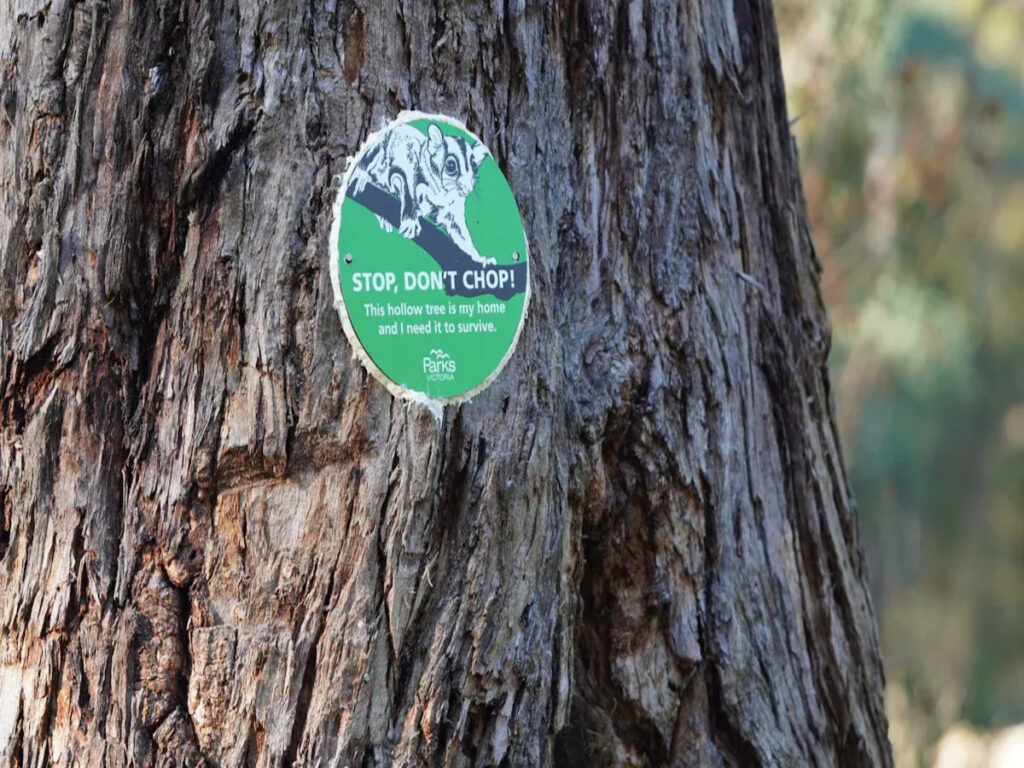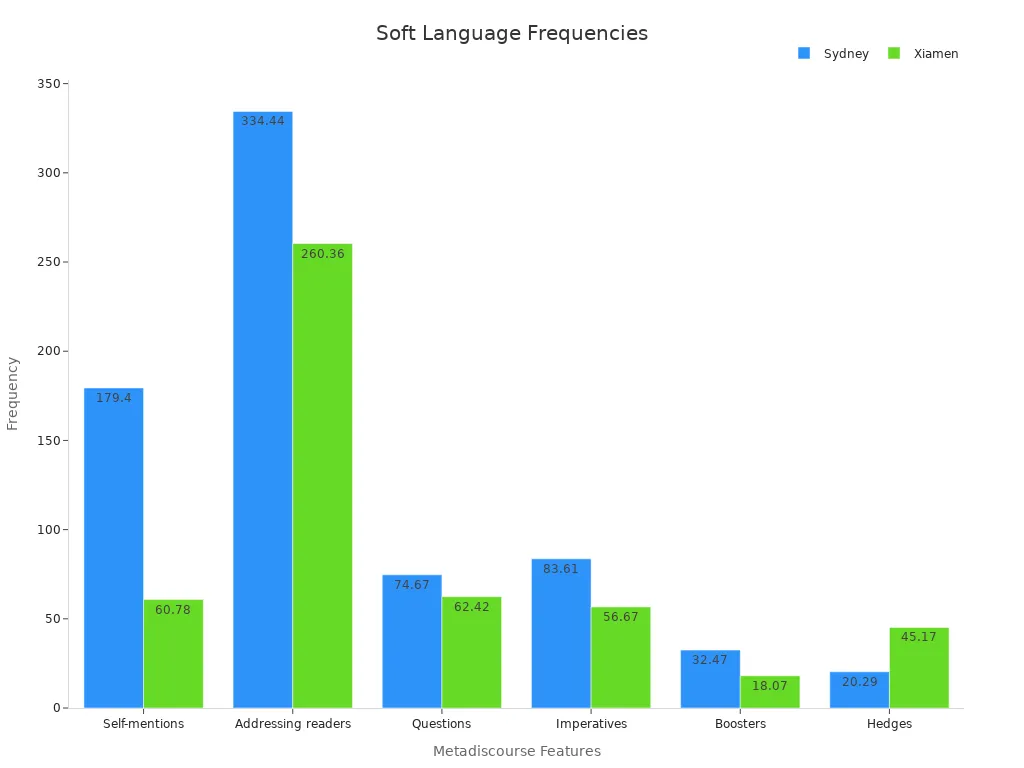
मेलबर्न पार्क में एक सार्वजनिक नोटिस कहता है, "कृपया घास से दूर रखना, हमारे समुदाय की देखभाल के लिए धन्यवाद। ” चीजों को कहने का यह सौम्य तरीका ऑस्ट्रेलियाई संकेतों पर आम है. यह लोगों को डर महसूस करने के बजाय सम्मान दिखाने के लिए कहता है.
नरम भाषा परिभाषित
नरम भाषा क्या है?
सॉफ्ट लैंग्वेज का अर्थ उन शब्दों का उपयोग करना है जो कोमल और विनम्र लगते हैं. लोग इसका इस्तेमाल करते हैं इसलिए वे असभ्य या बॉस नहीं लगते हैं. ऑस्ट्रेलिया मै, आप अक्सर संकेतों पर और दैनिक बात पर नरम भाषा देखते हैं. यह सभी का स्वागत और सम्मान महसूस करने में मदद करता है.
भाषाविदों का कहना है कि नरम भाषा शांत ध्वनियों की तरह /s /का उपयोग करती है, /श/, /एफ/, और द/. ये ध्वनियाँ अन्य अक्षरों की तरह जोर से नहीं हैं. मार्शल चोती, कौन सुनवाई और भाषण का अध्ययन करता है, कहते हैं कि अंग्रेजी इन नरम ध्वनियों का उपयोग करती है. यह अंग्रेजी ध्वनि को नरम बनाता है, विशेष रूप से वाक्यों के अंत में. जिस तरह से लोग इन ध्वनियों का उपयोग करते हैं वह बदल सकता है कि एक संदेश किसी को कैसा लगता है.
नरम भाषा विनम्र वाक्यांशों का भी उपयोग करती है. उदाहरण के लिए, एक संकेत कह सकता है, “कृपया प्रवेश न करें, धन्यवाद,” इसके बजाय “अंदर न आएं।” इस तरह, संकेत एक सख्त नियम देने के बजाय अच्छी तरह से पूछता है. लोग आमतौर पर बेहतर महसूस करते हैं जब वे नरम भाषा पढ़ते हैं या सुनते हैं.
लिखित और हस्ताक्षरित रूपों में सुविधाएँ
नरम भाषा का उपयोग लेखन और हस्ताक्षर दोनों में किया जाता है. लिखित संकेतों में, लोग दयालु शब्दों का उपयोग करते हैं, सौम्य अनुरोध, और धन्यवाद कहो. आप जैसे वाक्यांश देख सकते हैं “कृपया घास से दूर रखना” या “हम आपकी मदद की सराहना करते हैं।” ये शब्द सम्मान दिखाते हैं और लोगों को पसंद के अनुसार नियमों का पालन करने के लिए कहते हैं.
में, नरम भाषा सिर्फ हाथ के संकेतों से अधिक है. चेहरे के भाव और मुंह के आकार भी महत्वपूर्ण हैं. एक हस्ताक्षरकर्ता के पास एक शांत चेहरा या एक छोटी सी मुस्कान हो सकती है, यह दिखाने के लिए कि वे विनम्र हो रहे हैं. ये अतिरिक्त संकेत संदेश को अनुकूल महसूस करने में मदद करते हैं और बहुत सख्त नहीं हैं.
बख्शीश: लिखित या हस्ताक्षर में नरम भाषा का उपयोग करने से नियमों का पालन करना आसान हो सकता है. जब अनुरोध दयालु और विनम्र होता है तो लोग अक्सर अधिक सुनते हैं.
नरम भाषा लोगों को एक दूसरे पर भरोसा करने और एक साथ काम करने में मदद करती है. यह लोगों को नियमों का पालन करना चाहता है क्योंकि वे सम्मानित महसूस करते हैं, डरा हुआ नहीं.
ऑस्ट्रेलिया में सांस्कृतिक संदर्भ
राजनीति और अप्रत्यक्षता
ऑस्ट्रेलिया में लोग सोचते हैं कि विनम्र होना बहुत महत्वपूर्ण है. वे अक्सर कोमल शब्दों का उपयोग करते हैं इसलिए वे मतलब या बॉस नहीं करते हैं. यह सभी को सुरक्षित और सम्मानित महसूस करने में मदद करता है. बातचीत में, ऑस्ट्रेलियाई कह सकते हैं कि "क्या आप बुरा मानेंगे ..." या "अगर यह बहुत अधिक परेशानी नहीं है ..." किसी को यह बताने के बजाय कि क्या करना है. This way of speaking shows they want to keep peace and not start fights.
Signs in Australia also show these values. They do not give strict orders. बजाय, signs ask people nicely. उदाहरण के लिए, एक संकेत कह सकता है, “Please place rubbish in the bin” instead of “Do not litter.” This soft language makes people want to follow rules because they feel respected, डरा हुआ नहीं.
A survey in Australia showed most people think cultural diversity is very important. के बारे में 67% said respect, समझ, and shared values matter a lot. These ideas change how people talk and act in public places.
टिप्पणी: Using polite words can make rules feel like something everyone shares, not just strict orders.
Influence on Public Messaging
Cultural values change how public messages are made in Australia. Messages that show respect and understanding get more support from people. अध्ययन से पता चलता है कि राष्ट्रीय संस्कृति बदलती है कि लोग संदेशों पर कैसे प्रतिक्रिया करते हैं, जैसे ईमेल और सार्वजनिक संकेत. उदाहरण के लिए, सांस्कृतिक मूल्यों के साथ फिट होने वाले संदेश खोले जाते हैं और अधिक उत्तर देते हैं.
ऑस्ट्रेलियाई सार्वजनिक संदेशों में अक्सर ये चीजें होती हैं:
- स्पष्ट और सम्मानजनक शब्द
- समुदाय क्या साझा करता है, इस पर ध्यान केंद्रित करें
- विनम्र अनुरोध, आज्ञा नहीं
- सभी को शामिल करने की कोशिश करता है, बहुसंस्कृतिवाद दिखा रहा है
अनुसंधान से पता चलता है कि ऑस्ट्रेलिया में अच्छे सार्वजनिक संदेशों को स्पष्ट शब्दों और मजबूत नेताओं की आवश्यकता है. ये तरीके लोगों को एक दूसरे पर भरोसा करने और नियमों का पालन करने में मदद करते हैं. नरम भाषा का उपयोग करके, संकेत और संदेश लोगों को साथ पाने और एक साथ काम करने में मदद करते हैं.
वैध और सामुदायिक ढांचा
सामुदायिक-उन्मुख कानून
ऑस्ट्रेलिया में एक कानूनी प्रणाली है जो सामुदायिक मूल्यों का समर्थन करती है. कानूनविद लोगों को एक साथ काम करने में मदद करने के लिए नियम बनाते हैं. ये नियम लोगों को एक दूसरे का समर्थन करने में मदद करते हैं. कानून दान और स्थानीय क्लब जैसे समूहों की रक्षा करते हैं. वे यह भी सुनिश्चित करते हैं कि ये समूह निष्पक्ष और ईमानदार हैं.
नीचे दी गई तालिका ऑस्ट्रेलिया में कुछ मुख्य कानूनी रूपों और कानूनों को दिखाती है:
| वर्ग | विवरण | उदाहरण / विशिष्ट कानून |
|---|---|---|
| कानूनी रूप | ऑस्ट्रेलिया में सामुदायिक संगठनों के लिए विभिन्न कानूनी संरचनाएं | निगमित संघ (राज्य/क्षेत्र कानून), धर्मार्थ ट्रस्ट (राज्य सामान्य कानून और क़ानून), गारंटी द्वारा सीमित कंपनियां (निगम अधिनियम 2001) |
| संघीय विधान | राष्ट्रमंडल स्तर पर दान और सार्वजनिक लाभ को परिभाषित करने वाले कानून | चैरिटीज एक्ट 2013, निगम अधिनियम 2001 |
| राज्य और क्षेत्र अधिनियम | राज्य/क्षेत्र स्तर पर सामुदायिक संगठनों और गैर -लाभकारी गतिविधियों को नियंत्रित करने वाले विशिष्ट कानून | संघों का समावेश कार्य, धर्मार्थ ट्रस्ट अधिनियम, भेदभाव-विरोधी कार्य, धर्मार्थ धन उगाहने वाले अधिनियम, ट्रस्टी कार्य करता है, संग्रह कार्य करता है (विभिन्न राज्य) |
ये कानून समूहों को अच्छी तरह से काम करने और सभी के अधिकारों की रक्षा करने में मदद करते हैं. वे लोग भी अपने समुदायों में शामिल होने और मदद करना चाहते हैं.
कानूनी स्पष्टता और डी-एस्केलेशन
ऑस्ट्रेलियाई कानून स्पष्ट और शांत शब्दों का उपयोग करने की कोशिश करते हैं. कानून निर्माता चाहते हैं कि नियम समझने के लिए सरल हों. सार्वजनिक संकेत अक्सर इस कारण से नरम भाषा का उपयोग करते हैं. स्पष्ट और विनम्र शब्द लोगों को यह जानने में मदद करते हैं कि क्या करना है. वे लोगों को डरते नहीं हैं.
जब संकेत सौम्य शब्दों का उपयोग करते हैं, लोग सम्मानित महसूस करते हैं. यह शुरू होने से पहले झगड़े को रोक सकता है. उदाहरण के लिए, एक संकेत कह सकता है, "कृपया बिन में बकवास रखें।" यह एक स्पष्ट संदेश देता है लेकिन असभ्य नहीं है. पुलिस और परिषद के अधिकारी भी जनता के साथ शांत शब्दों का उपयोग करते हैं. यह चीजों को शांतिपूर्ण और सुरक्षित रखने में मदद करता है.
टिप्पणी: स्पष्ट और दयालु शब्दों का उपयोग करने वाले कानून सभी को स्वागत करने में मदद करते हैं. They also make it easier for people to follow rules and work together.
Soft Language in Australian Signs
Written Signage Examples
Australian signs use polite words to guide people. They do not give strict orders. बजाय, they ask people to do things kindly. उदाहरण के लिए, एक संकेत कह सकता है, “Please use the footpath.” It does not say, “Keep off the grass.” Another sign could read, “Thank you for helping keep our park clean.” These messages ask for help and show respect.
Many councils pick words that make people care about the community. आप देख सकते हैं, “We appreciate your support” or “Let’s keep this area tidy together.” These safety signs are in parks, libraries, and on public transport. This way of speaking is common in Australia. People there like to avoid fights and keep things peaceful.
बाल्गो क्षेत्र में अनुसंधान से पता चलता है कि नरम भाषा महत्वपूर्ण है. श्रवण और बहरे लोग दोनों हर दिन हाथ के संकेतों का उपयोग करते हैं. ये संकेत लोगों को चुपचाप और विनम्रता से समाचार साझा करने देते हैं. वे चुटकुले और व्यक्तित्व भी दिखाते हैं. इसका मतलब है कि नरम भाषा ऑस्ट्रेलियाई जीवन का एक बड़ा हिस्सा है.
अध्ययन ने देखा है कि क्या नरम भाषा लोगों को नियमों का पालन करने में मदद करती है. नीचे दी गई तालिका से पता चलता है कि कुछ अध्ययन क्या पाए गए:
| अध्ययन / शोधकर्ता | साक्ष्य के प्रकार | साइनेज अनुपालन में नरम भाषा प्रभावशीलता पर निष्कर्ष |
|---|---|---|
| मरहम एट अल. | पढ़ाई का क्षेत्र / प्रयोगसिद्ध | उस विनम्र का समर्थन मिला, गैर की मांग (कोमल) भाषा अनुपालन बढ़ा सकती है. |
| और अल. | प्रायोगिक तुलना | नरम संकेतों के बीच कोई महत्वपूर्ण अंतर नहीं (“शामिल होना!”) और धमकी देने वाला संकेत (“लिटरिंग गैरकानूनी है और एक के अधीन है $10 अच्छा”). |
| बाल्टेस और हेवर्ड | प्रायोगिक तुलना | विनम्र और मांग वाली भाषा के बीच अनुपालन में कोई महत्वपूर्ण अंतर नहीं मिला. |
| गेलर एट अल. | प्रायोगिक तुलना | तुलना “कृपया कूड़े न करें” बनाम. “आपको कूड़े नहीं होना चाहिए” और अनुपालन में कोई अंतर नहीं मिला. |
टिप्पणी: कुछ अध्ययनों का कहना है कि नरम भाषा मदद करती है. दूसरों का कहना है कि इससे ज्यादा फर्क नहीं पड़ता. उपयोग किए गए शब्द अभी भी बदल सकते हैं कि लोग नियमों के बारे में कैसा महसूस करते हैं.
मनोवैज्ञानिक प्रभाव
व्यवहार सिद्धांत
संकेतों में नरम भाषा व्यवहार विज्ञान विचारों से आती है. लोग आमतौर पर विनम्र और सम्मानजनक अनुरोधों के लिए बेहतर प्रतिक्रिया देते हैं. मनोवैज्ञानिकों का कहना है कि दयालु शब्द लोग महत्वपूर्ण महसूस करते हैं. यह भावना उन्हें नियमों की मदद या पालन करना चाहती है.
एक विनम्र चिन्ह कम तनाव में मदद कर सकता है. अगर कोई पढ़ता है, “कृपया बिन में बकवास रखें,” वे हमला नहीं करते हैं. वे इसे एक अनुकूल अनुस्मारक के रूप में देखते हैं. इस तरह सकारात्मक सुदृढीकरण का उपयोग करता है. यह धन्यवाद या प्रशंसा के साथ अच्छे कार्यों को पुरस्कृत करता है, सजा नहीं.
शोधकर्ताओं ने लोगों को एक समूह का हिस्सा होने की तरह पाया. नरम भाषा इस भावना को बनाने में मदद करती है. जब एक संकेत कहता है, “हमारे समुदाय की देखभाल के लिए धन्यवाद,” यह सभी को इसमें शामिल होने के लिए आमंत्रित करता है. लोग चाहते हैं, इसलिए वे अक्सर वही करते हैं जो संकेत पूछता है.
बख्शीश: नरम भाषा नियमों को एक साझा लक्ष्य की तरह महसूस कर सकती है, सिर्फ आरोप में किसी से आदेश नहीं.
अनुपालन पर प्रभाव
नरम भाषा बदल सकती है कि लोगों को नियमों का पालन करने की कितनी संभावना है. अध्ययन मिश्रित परिणाम दिखाते हैं, लेकिन बहुत से लोग संकेत देने के लिए अधिक इच्छुक महसूस करते हैं जब संकेत विनम्र शब्दों का उपयोग करते हैं. वे मजबूर महसूस नहीं करते हैं. बजाय, वे सम्मानित महसूस करते हैं.
नीचे दी गई तालिका से पता चलता है कि लोग विभिन्न प्रकार की भाषा पर कैसे प्रतिक्रिया करते हैं:
| भाषा का प्रकार | सामान्य प्रतिक्रिया |
|---|---|
| नरम/विनम्र | अधिक सकारात्मक भावनाएं |
| प्रत्यक्ष/सख्त | प्रतिरोध का कारण बन सकता है |
सार्वजनिक स्थानों पर, signs with soft language often lead to better behaviour. People pick up their rubbish or use the footpath because they want to help. Auslan users also respond to friendly facial expressions. A calm face or a small smile can make a signed message feel less harsh.
टिप्पणी: Soft language does not always guarantee perfect behaviour, but it often helps people feel good about following the rules.
मामले का अध्ययन
Public Signage Outcomes
Australian cities use soft language on public signs to make places friendly. Sydney is known for how it talks to people in public. Researchers looked at Sydney and Xiamen, a city in China. They wanted to see how often different language features are used in signs. नीचे दी गई तालिका से पता चलता है कि उन्हें क्या मिला:
| Interactional Metadiscourse Feature | सिडनी (आवृत्ति) | Xiamen (आवृत्ति) | महत्व (P-value) |
|---|---|---|---|
| Self-mentions | 179.40 | 60.78 | 0.000 |
| Addressing readers | 334.44 | 260.36 | 0.002 |
| Questions | 74.67 | 62.42 | 0.265 |
| Imperatives | 83.61 | 56.67 | 0.022 |
| Boosters | 32.47 | 18.07 | 0.047 |
| Hedges | 20.29 | 45.17 | 0.002 |
सिडनी सीधे पाठकों से अधिक आत्म-मानसिक और बातचीत का उपयोग करता है. यह ज़ियामेन की तुलना में अधिक अनिवार्यता और बूस्टर का भी उपयोग करता है. ये सुविधाएँ संदेश को नरम और अधिक व्यक्तिगत बनाने में मदद करती हैं. सिडनी कम हेजेज का उपयोग करता है, लेकिन वे अभी भी संदेश कोमल बनाते हैं. लेखन का यह तरीका लोगों को नियमों का पालन करना चाहता है. वे मजबूर महसूस नहीं करते हैं.

सिडनी के तरीके से पता चलता है कि संकेतों पर नरम भाषा लोगों को स्वागत कर सकती है. लोगों को एक साथ काम करने और नियमों का पालन करने की अधिक संभावना है. ऑस्ट्रेलियाई संकेत विश्वास बनाने और लोगों को अच्छा व्यवहार करने में मदद करने के लिए इन विचारों का उपयोग करते हैं.
अंतर्राष्ट्रीय तुलना
ऑस्ट्रेलिया बनाम. अन्य देश
ऑस्ट्रेलियाई सार्वजनिक संकेत नरम और विनम्र शब्दों का उपयोग करते हैं. यह संयुक्त राज्य अमेरिका या चीन में संकेतों से अलग है. ऑस्ट्रेलिया मै, संकेत अक्सर मदद मांगते हैं या धन्यवाद कहते हैं. उदाहरण के लिए, एक संकेत पढ़ सकता है, “हमारे समुद्र तट को साफ रखने के लिए धन्यवाद।” संयुक्त राज्य अमेरिका में, संकेत प्रत्यक्ष कमांड का उपयोग करते हैं जैसे “कोई अतिचार नहीं” या “दूर रहो।” चीनी संकेत बहुत औपचारिक या सख्त लग सकते हैं, विशेष रूप से आधिकारिक स्थानों पर.
नीचे एक तालिका कुछ सामान्य अंतर दिखाती है:
| देश | विशिष्ट सांकेतिक भाषा | टोन |
|---|---|---|
| ऑस्ट्रेलिया | “कृपया फुटपाथ का उपयोग करें” | विनम्र |
| संयुक्त राज्य अमेरिका | “अंदर आना मन है” | प्रत्यक्ष |
| चीन | “बिना अनुमति के प्रवेश न करें” | औपचारिक/सख्त |
ऑस्ट्रेलियाई संकेत विश्वास और सम्मान बनाने की कोशिश करते हैं. अन्य देश शक्ति दिखाने के लिए सख्त या प्रत्यक्ष शब्दों का उपयोग कर सकते हैं. ये अंतर दिखाते हैं कि प्रत्येक देश क्या महत्व देता है.
सूचनात्मक बनाम. टकरावपूर्ण दृष्टिकोण
देश सार्वजनिक संदेश लिखने के लिए विभिन्न तरीकों का उपयोग करते हैं. कुछ जानकारीपूर्ण भाषा का उपयोग करते हैं, जबकि अन्य एक टकराव की शैली का उपयोग करते हैं. सूचनात्मक संकेत तथ्य या विनम्र अनुरोध देते हैं. टकराव के संकेत मजबूत शब्दों या चेतावनियों का उपयोग करते हैं.
शोधकर्ताओं ने देखा कि लोग कैसे बात करते हैं 17 देशों. उन्होंने पाया कि:
- हर देश में लोग विभिन्न प्रकार की भाषा पसंद करते हैं.
- कुछ लोग अपनी स्वतंत्रता रखना चाहते हैं. उन्हें प्रत्यक्ष या यहां तक कि टकराव के संकेत पसंद हैं.
- अन्य लोग स्वीकार करना चाहते हैं. वे नरम पसंद करते हैं, अधिक जानकारीपूर्ण संकेत.
- यदि एक संस्कृति व्यक्तिवाद को महत्व देती है, लोग स्वीकार किए जाने के बारे में कम परवाह करते हैं.
- जिस तरह से संकेत लिखे जाते हैं वह व्यक्तिगत जरूरतों और संस्कृति दोनों पर निर्भर करता है.
- प्रत्येक देश के भीतर बहुत अंतर है, तो हर कोई एक ही शैली का उपयोग नहीं करता है.
टिप्पणी: जब वे संस्कृति और उन्हें पढ़ने वाले लोगों की जरूरतों को पूरा करते हैं, तो संकेत सबसे अच्छा काम करते हैं. ऑस्ट्रेलिया में नरम भाषा देश के मूल्यों से मेल खाती है और लोगों को सम्मानित महसूस करने में मदद करती है.
नीति और संचार निहितार्थ
प्रभावी संदेश रणनीति
ऑस्ट्रेलियाई नीति विशेषज्ञों का कहना है कि सार्वजनिक संदेशों के लिए स्पष्ट योजनाएं होना महत्वपूर्ण है. ये योजनाएं लोगों को यह जानने में मदद करती हैं कि क्या करना है. अच्छे संदेश आसान शब्दों का उपयोग करते हैं और विनम्रता से पूछते हैं. यह मेल खाता है कि कैसे ऑस्ट्रेलियाई संकेत लोगों से बात करते हैं.
अच्छे संदेश के लिए प्रमुख बिंदु हैं:
- स्पष्ट नियम सभी को यह जानने में मदद करते हैं कि क्या करना है. नीति अपडेट संदेशों को चालू रखें.
- एक मजबूत कहानी से पता चलता है कि ऑस्ट्रेलिया क्या मानता है और क्या समस्याएं हैं. यह लोगों को संदेश का हिस्सा महसूस करने में मदद करता है.
- लचीला होने से संदेशों को जरूरत पड़ने पर बदल जाता है. यह जानकारी सहायक रखता है.
- एक साथ काम करना सुनिश्चित करता है कि संदेश हर जगह समान हो.
- कई लोगों को सुनकर नए विचार लाते हैं. यह संदेशों को पूरे समुदाय को फिट करने में मदद करता है.
- समय के साथ सीखना लोगों को संदेश साझा करने में बेहतर होने में मदद करता है.
- उपकरणों का नियंत्रण रखने से समाज को खुला रखने में मदद मिलती है. नरम भाषा कठोर शब्दों का उपयोग नहीं करने से मदद करती है.
बख्शीश: संकेतों पर नरम भाषा का उपयोग करने से लोगों को सम्मानित महसूस करने में मदद मिल सकती है और नियमों का पालन करने की अधिक संभावना है.
नरम भाषा बदलती है कि लोग सार्वजनिक स्थानों पर कैसे व्यवहार करते हैं. दयालु शब्दों या मैत्रीपूर्ण चेहरों के संकेत लोगों को सम्मानित महसूस करते हैं. यह ऑस्ट्रेलियाई मूल्यों और निष्पक्षता के बारे में कानूनों के साथ फिट बैठता है. जो लोग नियम और संकेत बनाते हैं, वे दूसरों को बेहतर कार्य करने में मदद करने के लिए विनम्र शब्दों और स्पष्ट संकेतों का उपयोग कर सकते हैं.
इस बारे में अधिक जानने के लिए कि ऑस्ट्रेलियाई साइनेज कानून और मार्गदर्शन के बीच इस संतुलन को कैसे प्राप्त करता है, हमारे ब्लॉग पढ़ें: कैसे ऑस्ट्रेलियाई सुरक्षा संकेत सार्वजनिक मार्गदर्शन के साथ कानूनी प्रवर्तन का मिश्रण करते हैं.
अक्सर पूछे जाने वाले प्रश्न
ऑस्ट्रेलियाई सार्वजनिक संकेतों में नरम भाषा क्या है?
नरम भाषा का अर्थ है दयालु शब्दों और कोमल अनुरोधों का उपयोग करना. संकेत अक्सर शामिल होते हैं “कृपया” या “धन्यवाद”. ये शब्द लोगों को सम्मानित महसूस करने में मदद करते हैं. वे बॉस या असभ्य नहीं लगते हैं.
औसलान सार्वजनिक संदेशों में राजनीति कैसे दिखाता है?
Auslan हस्ताक्षरकर्ता अपने चेहरे और आराम से शरीर का उपयोग करते हैं. एक छोटी सी मुस्कान या शांत आँखें संदेश को अनुकूल बनाती हैं. ये संकेत लोगों को स्वागत और सुरक्षित महसूस करने में मदद करते हैं.
क्यों ऑस्ट्रेलियाई संकेत सख्त कमांड से बचते हैं?
आस्ट्रेलियाई लोग सम्मान और एक साथ काम कर रहे हैं. संकेत मदद के लिए पूछने के लिए नरम भाषा का उपयोग करते हैं. अच्छी तरह से पूछे जाने पर लोगों को नियमों का पालन करने की अधिक संभावना है.
क्या नरम भाषा वास्तव में सार्वजनिक व्यवहार को बदल देती है?
अध्ययन अलग -अलग परिणाम दिखाते हैं. बहुत से लोग खुश महसूस करते हैं और जब संकेत विनम्र शब्दों का उपयोग करते हैं तो मदद करना चाहते हैं. नरम भाषा नियमों को महसूस कर सकती है जैसे हर कोई साझा करता है.

















